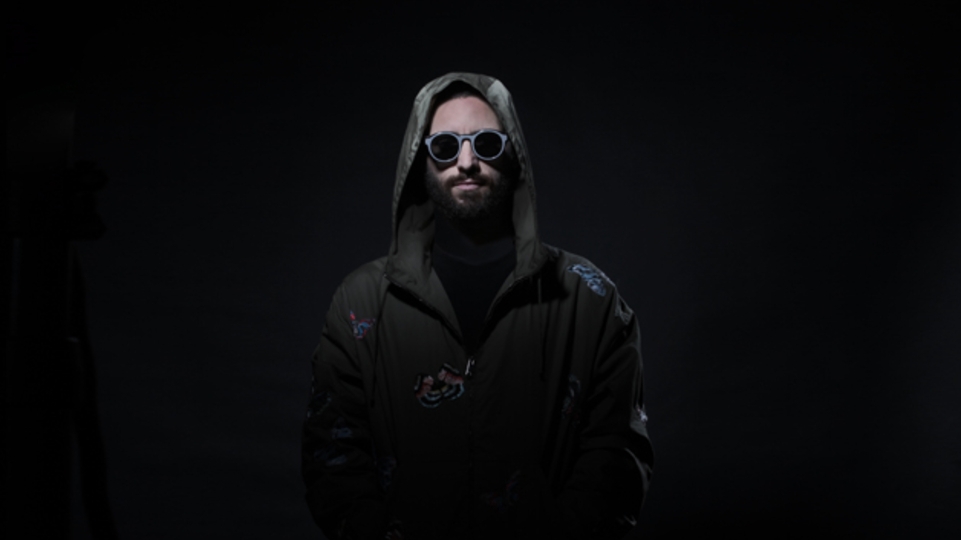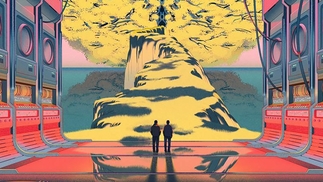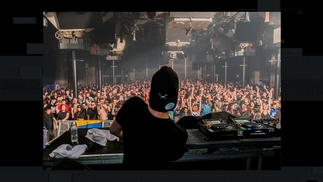PAUL WOOLFORD: INCENDIARY DEVICE
We meet the Leeds man in London to talk about hardcore history, subliminal messages and breaking free of genre constrictions — and much more...

Reinvention is a tough gig. But if you get it right, a whole new life is possible. No one in dance music's managed this more successfully than Paul Woolford and his hardcore junglist alter ego Special Request.
Just consider the ingredients. Bass you don’t hear but feel, vibrating the vertebrae. Splintered shards of breakbeat pressure. Motor City future riffs. Ominous synths that sound like rave revenants descending from eternal warehouse tear-ups. These are the components that make Special Request a million miles from identikit house DJs and rolling techno bores.
But a new chapter is about to open up. Woolford’s signed his new record to the world’s biggest, most visible independent label — XL. The Special Request story is about to go widescreen, with new music that must be heard to be believed.
Meeting Paul midsummer in the plush surroundings of London’s Claridges hotel, his move makes perfect sense. XL is, after all, the home of hardcore. It may have changed its spots in latter years with such diverse signings as The White Stripes, M.I.A and FKA twigs, but this is the label that launched The Prodigy, SL2, Jonny L, Dance Conspiracy and many more foundation rave acts into the world.
“XL have nothing to prove, they’re a record company that have done what they’ve done and they’ve grown it from this sound,” Paul says. “I guess my involvement, what I’m bringing to them, is almost a little part of their roots in a way. The label was founded on one-off 12s by people, of quite abrasive hardcore.”
It’s the kind of music that first lit a spark in Paul when he was growing up. His first musical love, one you never forget. “So many of those records have been incredible for me, going through my teenage years — T99 ‘Anastasia’, Cubic 22 ‘Night In Motion’. So many of them! The Prodigy stuff, of course. The amount of energy in those records, getting them home and putting them on as a teenager, you’re like, ‘How do these records sound like this?’ They sound this big, they sound terrifying, they sound great and they sound warm...
it all sounded like it was from another world, and that’s what I wanted to do, to build on what I’d already done as Special Request, and to try and get it right to the very core, the heart of what these tracks are, when you’re in there, right inside there. I want the tracks to be like that, without any pretense, we’re not gonna dress it up as anything it isn’t. It’s just... (smacks palm) that was the aim. I really think we’ve got there.”
Too right. The follow-up record to ‘Soul Music’ is the perfect set to restore XL’s hardcore rep and to elevate Special Request to a whole new sphere. Titled ‘Modern Warfare’, it’s a long EP, a double-pack designed for club use — for the most part. If ‘Soul Music’ introduced a fresh perspective on jungle, slowing the beats and injecting it with next-gen techno steroids, ‘Modern Warfare’ is its mutant cousin: a dangerously perfected T1000 model with a new bag of tricks more deadly than its predecessor.
Most of all, there’s the introduction of 4/4 kick-drums, bringing it in line with house music, but still possessed of those lethal, chopping breakbeats that are the Special Request signature. The tune ‘Reset It’, with its titanium drum-breaks, MC samples, thudding kicks and shimmering Balearic breakdown, is redolent of the moment in history before the dance scene split into factions and separate genres, when all different styles mingled in the DJ sets of Fabio and Grooverider, for instance.
“It’s a different side of the sound, really,” Paul says. “There were so many hardcore but still 4/4 records that were brilliant over the years, Basement Records put out so many things like that, I always loved that sound and I always planned to do it, but I had to work out where and in what place, and would they get missed if I did an EP like that, if I did it as a white label, how’s that gonna fly? But once I started, I had all the ideas. Once it came to it, once I started recording it all, what comes out comes out. I’ve learnt over the years not to get too caught up in, ‘It’s got to be this’.”
JUNGLE
In his hotel, Paul greets DJ Mag warmly with a brightness and confident intelligence as we’re ushered into his hotel room to talk about the new record.
We sit and drink tea. Paul’s is augmented with a Bloody Mary. Jazz spills at low volume from his laptop, while a copy of Iain Sinclair’s psycho-geography tome London Orbital sits on the side table. Paul seems comfortable enough in the storied old establishment, light years from the nearest warehouse grot-pit, but is unimpressed by the upholstery (“it’s a bit old school!” he jokes).
He’s open and considered in his answers, especially frank when we ponder whether the transition to a house tempo could be designed to bring his Special Request material more in-line with his DJ sets and productions as Paul Woolford. After all, in the past certainly, Paul was known most for playing, and making, house and techno, cutting classic tracks like the android bubbler ‘Erotic Discourse’ as Bobby Peru or his techno funk ‘Rewurq’ of T. Williams’ ‘Heartbeat’ — each innovative but still resolutely club-geared house records.
Despite its protestations to the contrary, the dance scene has a conservatism when it comes to stepping outside rigid genre templates.
“It’s not a cynical attempt but it could seem like a way of tempering it all to make life easy for myself,” Paul admits. “I was thinking, ‘You know what, this stuff sounds like it’s playable by house DJs’, and it’s weird, I’ve been playing a lot of those tunes out when I’ve been playing under my own name. Watching audiences, cos they don’t know those records yet at all.
I always find the acid test is when people don’t know them and you watch them and you see. It means that more of these records are playing when I’m playing house and techno and also, the Special Request sets, when I first started going out there playing them it was all jungle, it started at 160 and was going in like that. And you can only do that if you’re in the right place. Sometimes it has to be the right moment in the right place like the end of a festival, if you’re surrounded by house DJs you can’t be playing like that in the middle of the night cos the flow is fucked up.
“You’d be surprised by how fussy some people are,” he continues. “In the UK we’re better at that, we’re more open-minded than most. My life is definitely made a little bit easier by the fact I can go and play a Special Request set and play half and half, a more extreme 4/4 record before it moves up into the jungle stuff.”
That perceived rigidity in people’s perceptions, says Paul, is what spurred the creation of Special Request. Rather than release the broken beat material under his own name, he thought it necessary to make the separation so as not to confuse audiences. “It’s always frustrated me, this is probably why I did end up doing a separate project, because I used to be DJing and it would get later and later and I would get into the zone where I would be playing more extreme records. People would be getting fucked off! Regularly I’d be playing gigs and people would be coming up and saying, ‘Mate, what’s this?’ It would just be absolutely ridiculous, you get to the point where you open the doors to being able to do something a little bit wider. So many times over the years I’ve had that. But I would be more extreme then because I didn’t have this second way of expressing myself.
By and large I would never play a jungle record in a house and techno set, unless there’s people there that are saying that’s what they want. Which does happen as well, it can get pretty confusing sometimes!”

JUDDERING
Some people don’t like it when the dance narrative gets a surprise twist. It’s been a few years since the seismic disruption of Special Request’s debut album ‘Soul Music’, a record that appeared in the most unexpected way, from the most unexpected source. A super-tough take on jungle, hardcore rave, gutter techno and warehouse beats with a modern sheen, it arrived in a dance scene that was — bar the drum & bass and bass camps — practically allergic to breakbeats.
‘Soul Music’ brought them fracturing and juddering back to the surface of our collective conscious. That it was the work of a DJ/producer who, despite his versatility, was known for straight 4/4, seemed even more quizzical and hard to countenance. Yet this was something so authentic, intricate and heavy, it was to prove a serious upset to the notion of rigid genres and purist DJs.
In his fusion of micro-chopped drum-breaks and modern techno tropes, Special Request was embraced by the more adventurous DJs and those on the cutting edge of bass music, lauded by the more open-minded within the drum & bass scene (he’s played on the same bills as Goldie and got props from Andy C), but eyed with suspicion by some, who saw an interloper in their midst. Some looked on in bemusement, but just as many were bowled over by his fresh sound.
Some have accused Special Request of being a nostalgia exercise, but crucial to the sound, then and now, is a techno component that filters through from his 4/4 projects. To any haters, Paul points out that Special Request is from a real place, made with authentic, internalised tools, and its modern edge is vital. “What you’re saying about the modernity, it has to be,” Paul insists.
“I’m skirting a fine line because the easiest thing, if anyone wants to shoot this down, the easiest criticism anyone can level at this project is they can say, ‘This is nostalgia’, and I’m making this argument really easy to level at me because I’m using sounds and breakbeats particularly that have been rinsed to the nth degree, a million times. But it’s all in how they’re applied. It’s like speaking a language.
You can’t blag it, if you know the language inside out then you’re not gonna get it wrong. I feel with these things they’ve been around me for so long, they’ve been a part of my life for so long I know how to apply them.”
UNDERGROUND
With a wave of copyists emerging in his wake, there was a hint that Special Request might cause a new scene to develop but rather than cash in, Woolford has bided his time. If anything, ‘Modern Warfare’ is more avowedly underground, in part a product of Paul’s brush with fame when the house track ‘Untitled’, originally released via Hotflush, blew up and was then signed by a major label. They added a vocal to the track, and it’s an experience he is reticent to talk about. What he will say is how a more accessible house track he premiered on the radio made him re-evaluate and take a step back, deciding not to release it and instead create something new from its vocal, that now forms part of immense Special Request tune ‘Amnesia’, ‘Modern Warfare’s second track.
“It’s a sample actually, of a girl called Maria Marcial. It’s funny what happened with that, it was something on Kerri Chandler’s label [Madhouse]. I cleared it about two years ago for a house track. Not much different but no breakbeats in it, no gnarly bass. I put the track on to the radio, didn’t sign it, gave it to Annie Mac and a few other people, and it got loads of airplay. I got loads of offers for it and then it got to the point where I thought, ‘This isn’t quite right’. It’s a weird position, especially when you’re getting offered good money on something, you’re not quite sure. I forgot about it for a bit and started working on the XL stuff. I was like, ‘Ah! I pulled the vocal out again and I was like, ‘Here we go!’ Luckily when I’d done the sample clearance, on the form it said ‘track to be confirmed’, so it wasn’t named what it was gonna be.”
‘Amnesia’ now is a roughneck jungle house dispatch with its ‘Fool’s Gold’ break, 4/4 thump, sub-whumps and great splurges of Reese bass darkness, given that soulful edge present in the best d&b by that gorgeous Maria Marcial vox.

BOMBS
It’s also got a small vocal sample of the phrase “Dubplate pressure” which, rather than being sourced from an old d&b pirate radio transmission, is from Paul ‘Trouble’ Anderson’s Kiss FM show. Paul is keen to point out the importance of the influence of the US garage Paul played, which he feels is too often forgotten or ignored in the grand narrative of how dance music’s evolved.
“I think that original US garage sound has been slightly overlooked over the years in all the hype around ‘deep house’... it's always been a key part of the whole picture, and even if the gospel influences don't translate so well it's still so important to house music's development and journey into something that is now accepted by the mainstream.”
The dual function of that sample — both as a party-hyping device and an inter-textual nod to his musical influences — is typical of Paul’s floor-geared but intelligent approach to production.
‘Modern Warfare’ is full of club bombs of course, but dig a little deeper and its title, and subtle aspects of the sound, tell of something more. When quizzed on the subject, Paul talks at length about the artwork for the record, which has gone through many different options and redesigns, some deemed too controversial or likely to be misinterpreted. He tells of the opening sample of the title track, that of a flamethrower being fired up; listen back and it’s chilling. Similarly, the track ‘Damage’ begins with what sounds like a building collapsing slowly into rubble, its textural effect pleasant to the ear at least, its source less so.
These darker elements lie within a club record, but are still able to allude to the rapid acceptance and impassivity we experience in response to war everywhere around the world — and its perpetual broadcast on rolling news channels, in our increasingly visual culture. “We’re all getting used to images of war daily, we’re all being desensitized to it. I try not to watch news anymore. I read the paper but I don’t watch the news because it eats away at me. I find myself getting more and more wound up with the fact that slowly we’re being desensitized to images of war.
“Here’s something that is just bizarre, drones... the idea that a drone is something that we would use as citizens is becoming the norm now. You can go on Amazon and buy a drone. I’ve been looking at what’s out there, what you can buy. You can buy a drone, you can buy something for your kids to fly. Why would your child want to fly a drone, something that is a weapon of war? But this is normal, the world around us, I’m finding it a terrifying place really in many ways.”
Woolford uses samples to disseminate political meaning, but is careful not to overload what is still designed for club use. “It’s hard to say something, to speak out about these things when you really stand to alienate your audience, in this game. Also, if you’re more visible, that then creates problems for you — we have to travel every weekend doing what we do. If you’re too outspoken about different foreign policies, that’s gonna cause you problems down the line. There are people that I know that have had these problems. So I wanted to make a bit of a comment without being too explicit.”
CONTRAST
With lush melodies emerging from the darkness, rave music has always had the balance of light and shade, that tipping point between excess and overdose. It’s the element of contrast which he says lies at the heart of his tunes — how dance music offers a brief transcendence from the worries of life, and stands in opposition to them, if only for a moment.
“There’s enough in there to give people a jab, but at the end of the day this is escapism as well,” Paul says. “And what really works for me, what really interests me, is contrasting these things. Here’s society, on one hand up shit creek, and then there’s this, which is escape. Let’s put a mirror there, it’s how it can be. Cos when we’re out, and you’re having the time of your life with your mates and you’re right there in the eye of the storm, there’s no greater feeling. You’re living your life to the full, that’s the polar opposite of everything else, all this other dark shit. It’s about being the polar opposite of that.”
Right now Paul feels his production has hit a new high. That he’s able to finally realize exactly the tunes he’s had swimming around his brain for years but has never quite been able to articulate. He’s changed his way of working, moving his studio to the kitchen in his house — which he points out, with a grin, is where many pirate radio transmissions were made in the past also, which he reckons has completely freed up his production methods. But it’s come from a great deal of graft and blood, sweat and tears.
We talk about whether jungle, in its intricate beat-editing, is harder to make than house, and he shares a few nuggets about the long-winded but ultimately hugely satisfying way he sets up a track. “It’s a completely different technique to making house,” Paul says. “It can be a longer technique, setting it all up is the fiddly stuff really but then once you’ve got the breakbeats on the keys and you start getting them in time, the excitement level, you feel like you’re gonna explode! Your hairs go up and immediately it takes flight, and then that leads you onto the next part.”
He starts talking about the production technique he used on ‘Tractor Beam’ — a killer cut of pure jungle on the record, harking back to the earlier ‘Soul Music’ vibe, all soundsystem blips and doubled-up breaks, before a trippy sub-acid riff enters and takes it skyward.
“‘Tractor Beam’, that’s the one that is the most jungle. The idea for it is so daft really, but I was listening to an old DJ Hype mix, it was an old Dreamscape thing. He had two copies of this tune doing the old double-beating and I was like, ‘I need to do a tune that double beats’. So ‘Tractor Beam’, I did all the drums, did the tune, but then thought, 'What else does it need?' So I copied it on top of itself and then moved it over, so it starts going in and out. It sounds like there’s a DJ playing two copies of it, going in and out.
It dawned on me, why haven’t I thought about doing that before? But it’s just a really simple idea, nine times out of 10 it doesn’t matter how complex it gets, it can get so fiddly, but the things that are most effective are the simplest ideas, always.”
It’s not just XL who want a piece of Special Request. Just lately he’s remixed Chemical Brothers, Leftfield, Wiley and, appropriately enough, Jungle. When asked about how many tracks he made for the XL EP, he reveals there are a lot more waiting in the wings — and how he likes the idea of doing an ambient-style version of the album, almost beatless. But it’s the tear-out rawness that will have them flocking when XL drops the bomb.





